25 Most Influential Economics Books 2010–2026
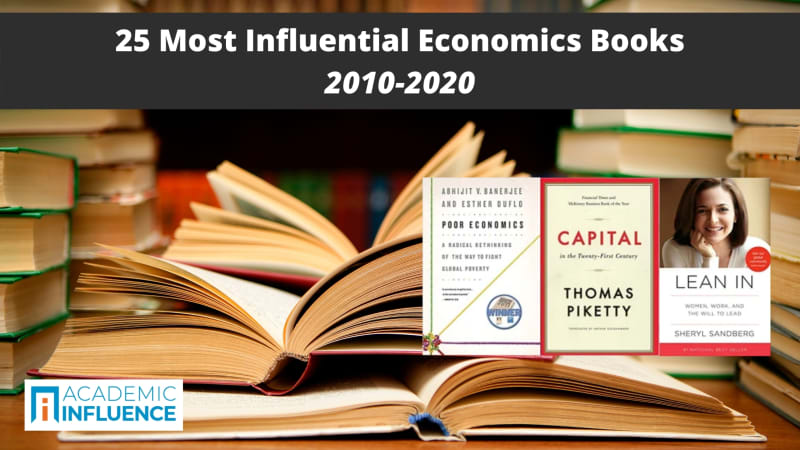
Economics is an extremely broad academic discipline, which includes the study of all human productive and exchange activity. Abstractly, it is about the relative values that all these activities and their products come to have. Concretely, it encompasses everything from small business firms, giant corporations, goods, markets, and money, to banks and investment firms, to government policy relating to trade, taxation, and the money supply.
Key Takeaways
- One of the most important resources for economics students is good economics books. Our list contains economics books that have had the greatest combined academic and popular impact over the last decade.
- The books in this list can prepare you to take on a bachelor’s degree in economics, or give you a better understanding of the field of economics.
Books for Every Economics Major
Economics mainly focuses on describing and analyzing. While the field is generally considered a social science because it attempts to explain the behaviors of people or organizations through economic ideas, economics is heavily based on statistics and mathematics, unlike most social sciences. This is why most college-level students need to complete upper-level statistics and math courses as requirements before majoring in economics.
Economics is a challenging major for many students, especially during the first two years in college. Economics books, therefore, are great resources to prepare for further study during college.
But more than reading the best economics book, you must understand why studying economics is a great advantage.
Importance of Studying Economics
If you choose to major in economics, you will gain the necessary skills to understand free market economic theory and the other complicated market principles. Plus, you will increase your problem-solving and analytical skills and the business acumen indispensable in succeeding in the professional world.
Here are the top reasons why studying economics is a good choice.
Economics Helps to Improve your Vocabulary
Whether it is opportunity costs, scarcity, or equilibrium, an economics degree will make you fluent with the fundamental terms you need to know and understand how every market works. Even if you won’t be using these terms in your present role, educating yourself with these economic terms allows you to fully grasp the market dynamics as a whole.
Economics Helps You to Understand Your Spending Habits
Through economics, you learn how the market behaves and gives you a better understanding of spending habits and values. Willingness to Pay, for example, is a term that refers to the maximum amount one is willing to pay for services or goods.
There is a frequent gap between actual and hypothetical WTP, and if you are armed with knowledge about it, you can decode your spending behaviors, and potentially make wiser financial decisions.
Economics Prepares You for Graduate School
If you’re considering getting a graduate degree in business degree, a degree in economics can help prepare you for an MBA. MBAs usually include accounting, finance, marketing, management, and economics courses. Thus, an “economic thought” gives you a step ahead if you pursue a master’s in the future.
Economics Teaches You How to Control Economic Tools
Understanding economic theories are one thing; creating the tools to make intelligent business decisions is another. Economics teaches you the fundamentals of the field and gives you solid tools for analysis. These tools can be used in many different career fields.
Economics Opens Better Career Opportunities
Studying economics can significantly open better career opportunities for you in various industries. In the Future of Jobs Report by the World Economic Forum, complex problem-solving and critical and analytical thinking skills will be the best transferable skills for employers by 2025. You can gain these skills when you study economics!
Many careers need knowledge of economic models, concepts, and relationships. Potential career paths for economics degree holders include banking, finance, insurance, healthcare administration, or politics.
How did we determine which books made our list?
This is a list of the most influential books in economics of the past decade (2010–2020), where we have assigned an objective measure of “influence” to each book on the basis of the number of references it has received in both the academic literature and the popular media.
Note that our list does not necessarily represent the most popular books overall published during the past ten years, nor is it a list of economics bestsellers during that time frame—for several reasons.
For one thing, we have excluded reference works in economics, as well as sacred texts that may contain economic material. All but the very most influential fictional works dealing with economic themes have also been excluded from our list.
For another thing, our list includes several perennial classics that remain influential today—one of them published nearly 250 years ago! Not only do several such works retain great contemporary influence, in some cases they have even enjoyed a resurgence in popularity in recent years.
Nevertheless, ours is not a list of the most influential economics books of all time. That list would have a very different look and feel to it. Rather, our list provides you with the 25 books on economics that have had the greatest combined academic and popular impact over the past decade.
If you’re interested in dedicating your college education to economics, check out The Best Colleges & Universities for a Bachelor’s in Economics.
Otherwise, read on for a look at the 25 Most Influential Books in Economics.
The Most Influential Economics Books 2010–2020
1. Poor Economics: A Radical Rethinking of the Way to Fight Global Poverty
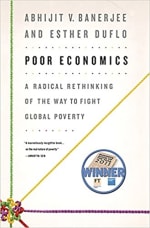

By: Abhijit V. Banerjee and Esther Duflo, 2011
The authors, who shared the 2019 Nobel Prize in Economics (along with Michael Kremer), are in the forefront of development economics today. Their book provides an intimate look at the daily lives of some of the world’s poorest people and the economic decisions they face. The authors argue that international aid ought to be evaluated on the basis of experimental evidence about which measures really do improve people’s lives with respect to education, health, access to capital, and more.
2. Capital in the Twenty-First Century
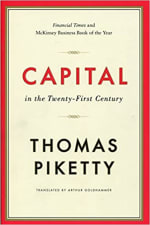

By: Thomas Piketty, 2014
Originally published in 2013 as Le capital au XXIe siècle, the author’s book became an international bestseller the following year in the English translation by Arthur Goldhammer. Through a wide-ranging historical analysis, the author makes the case that today’s income inequality is a built-in feature of industrial capitalism, which can only be cured by economic redistribution on a massive scale, preferably by means of a global tax on wealth.
3. Lean In: Women, Work, and the Will to Lead
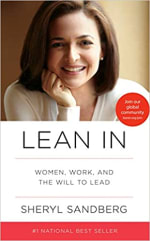

By: Sheryl Sandberg, 2013
In this controversial book, the author—who is Facebook’s Chief Operating Officer–uses both data and personal anecdote to argue that women can succeed in high-powered careers by “leaning in,” meaning shedding a psychology of risk aversion and committing to taking risks, facing challenges, and doing what it takes to succeed in their careers. She also acknowledges that men need to change psychologically, both at home and in the workplace, to make this psychological change in women possible.
4. Freakonomics: A Rogue Economist Explores the Hidden Side of Everything
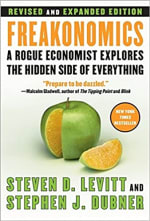

By: Steven D. Levitt and Stephen J. Dubner, 2005
Economist Levitt and journalist Dubner hit the jackpot with what is probably the most-popular pop-economics textbook of all time. The authors explore the economics of a wide variety of out-of-the-ordinary, yet everyday transactions among, for example, public school teachers and their students, parents and their children, drug dealers, white supremacists, and much, much more, explaining the hidden rationales that lead people to do what they do. The outstanding success of this book led to its quick re-release in a revised and expanded edition the year following its original publication.
5. Prosperity without Growth: Foundations for the Economy of Tomorrow
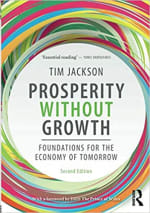

By: Tim Jackson, 2009
The author of this book argues that the mainstream model of economic prosperity linked to continuous growth is unsustainable. He offers an alternative vision of sustainable global prosperity that can be achieved by changing our current consumerist understanding of what it means to “flourish.” The book was published in a substantially rewritten, second edition in 2016.
6. The Entrepreneurial State: Debunking Public vs. Private Sector Myths
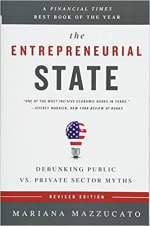

By: Mariana Mazzucato, 2011
Originally published in the UK, this book’s 2015 US edition has been widely discussed by both academic economists and the wider public commentariat. The author argues that the startling growth in global prosperity during the postwar period has been mainly due to governmental guidance of the private sector. The most obvious example is the unprecedented levels of direct financial support for technological innovation provided by the governments of most Western countries—which, in turn, has been their main driver of economic growth.
7. The Global Minotaur: America, Europe and the Future of the Global Economy


By: Yanis Varoufakis, 2011
This book is a manifesto penned by a Greek politician and former Finance Minister, who is one of the most famous opponents of the European Union–imposed policy of austerity. He uses the Greek myth of the Minotaur as a metaphor for an insatiable, global, neoliberal financial order sustained by human sacrifices. The book was released in a third edition in 2015.
8. An Inquiry into the Nature and Causes of the Wealth of Nations


By: Adam Smith, 1776
Authored by a professor of moral philosophy at the University of Glasgow in Scotland, this book is often considered to be the founding document of the science of economics. Smith’s detailed depiction of the division of labor (a pin factory) and his analysis of the self-organization of markets (“the invisible hand”) are among the best-known highlights of this classic text. The Wealth of Nations is available in numerous recent editions.
9. Capital: A Critique of Political Economy


By: Karl Marx
Volume One: 1867
Volume Two: 1885
Volume Three: 1894
Volume One was first published in English as Capital: A Critique of Political Economy in 1867 in a translation by Samuel Moore. Volumes Two and Three were first published posthumously by Marx’s friend, Friedrich Engels, based on the author’s notes. In this dense and heavily footnoted, classic work, Marx analyzes world history from the perspective of dialectical materialism, class struggle, the labor theory of value, and other foundational concepts of socialist and communist economic theory. Volume One is the most-read section of Capital; it is widely available in numerous recent editions. (Volumes Two and Three are also available, but in far fewer editions.)
10. The Shock Doctrine: The Rise of Disaster Capitalism
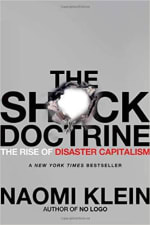

By: Naomi Klein, 2007
The author is a professor of media and women’s studies, who has written extensively on the economic consequences of neoliberalism and globalization. In this book—her third—Klein examines a wide range of recent world events through the lens of her central thesis that global capital takes advantage of local “shocks,” such as wars and revolutions, in various countries to impose the neoliberal system on them.
11. Atlas Shrugged
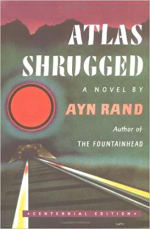

By: Ayn Rand, 1957
The author was born Alisa Rosenbaum in St. Petersburg and emigrated to the United States as a young woman. Atlas Shrugged, written directly in English, was her fourth and final novel. It depicts a “strike” by leading industrialists and entrepreneurs to protest the growing intrusiveness of big government. More successful as a polemic than a work of art, this novel has inspired generations of free-market economists and libertarian philosophers, many of whom have acknowledged it as a decisive influence on their lives and careers. In recent years, there has been a revival of academic interest in the author’s nonfiction writings on a broad range of philosophical questions. Atlas Shrugged is available in several recent editions.
12. Capital and Ideology
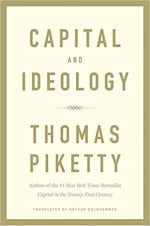

By: Thomas Piketty, 2020
First published in France as Capital et Idéologiein 2019 and translated by Arthur Goldhammer, this book is a follow-up to the author’s runaway bestseller of 2014 (#2 on this list). This time out of the gate, the author extends his discussion to investigate the origins of inequality in societies throughout the world from the dawn of history until the present. Piketty argues that any society’s economy is not a “natural,” hence necessary, phenomenon, but a contingent social construct foisted onto the powerless by the powerful for the benefit of the latter.
13. More Money Than God: Hedge Funds and the Making of a New Elite
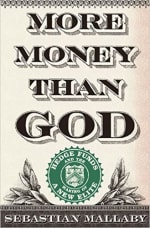

By: Sebastian Mallaby, 2010
The author provides us with a history of the financial industry in the US since the 1960s. The major focus is on the story of the rise of hedge funds, culminating in the financial crisis of 2008. Replete with colorful portraits of many of the major players involved, this book is a critique of the over-financialization of the capitalist system in terms of its deleterious impact on the broader economy and the well-being of society as a whole.
14. Predictably Irrational: The Hidden Forces That Shape Our Decisions
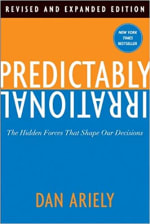

By: Dan Ariely, 2008
This book has been one of the most successful efforts to present the results of the new behavioral economics to a popular audience. Employing both empirical psychological data and amusing anecdotes, the author shows, first, how people’s behavior falls short of ideal rationality (in a logical sense) in numerous, predictable ways, and, second, how this knowledge can be used to shape the social environment to help people attain better outcomes. The book was released in a revised and expanded edition in 2010.
15. The Limits to Growth: The 30-Year Update
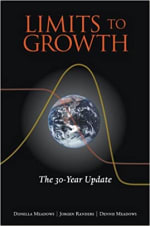

By: Donella H. Meadows, Jørgen Randers, and Dennis L. Meadows, 2004
In 1972, the three authors of this 30-Year Update (together with William W. Behrens III) published The Limits to Growth: A Report for the Club of Rome’s Project on the Predicament of Mankind, which was one of the first major warnings about the unsustainability of contemporary economic, population, and other civilizational trends. The authors’ new book reports on what has happened during the 30 intervening years, offering an up-to-date revision of their original warning.
16. The Road to Serfdom


By: F.A. Hayek, 1944
The author, an Austrian-born, Nobel Prize–winning economist, participated in the “socialist economic calculation debate” during the 1930s, arguing that the effective central planning of a large economy is a practical impossibility. He later emigrated to the UK, then to the US. He wrote this classic anti-socialist polemic in London, directly in English, during World War II. Originally published in 1944, the book reached a much-wider audience when an abridged version appeared the following year in Reader’s Digest magazine. In 1994, it was reprinted in a “50th Anniversary Edition,” and in 2007, it was re-issued in a “Definitive Edition” as Volume 2 of the author’s Collected Works.
17. Debt: The First 5000 Years
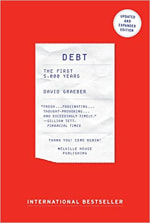

By: David Graeber, 2011
The author sketches a history of world economic development focused on the notion that debt — not a mythical barter system — is the primordial means human beings have used to facilitate the exchange of goods throughout the ages, predating the introduction of money. The book also argues that disputes involving debt and debt-forgiveness have been a driving force of social and political change worldwide. An updated and expanded edition was published in 2014.
18. Progress and Poverty: An Inquiry into the Cause of Industrial Depressions and of Increase of Want with Increase of Wealth; The Remedy


By: Henry George, 1879
A late-nineteenth- and early-twentieth-century bestseller, this book has been republished repeatedly. Numerous recent editions are available. It influenced many prominent intellectuals, politicians, and ordinary citizens around the turn of the twentieth century—notably, Leo Tolstoy, Bertrand Russell, and John Dewey. Interest in the book has grown during the twenty-first century due to the recent revival of socialist thought. The author argues that private property rights ought to be severely curtailed, with all land and natural resources being owned and administered by the state. The book is available in numerous recent editions.
19. Small is Beautiful: A Study of Economics as if People Mattered
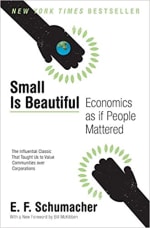

By: E.F. Schumacher, 1973
This book is a philosophical work of political economy which has inspired numerous cultural and political trends, including the green and locavore movements. The author argues that economies of scale are purchased too dearly by giant corporations, seeing that they cultivate a consumerist mentality which in turn produces profound spiritual alienation. He calls for re-embracing small-scale economic production, the better to serve real human needs. The book is available in several recent editions.
20. Saving Capitalism from the Capitalists: Unleashing the Power of Financial Markets to Create Wealth and Spread Opportunity
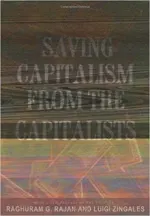

By: Raghuram G. Rajan and Luigi Zingales, 2003
This book takes the side of financial markets, explaining how they are an essential feature of the capitalist economic engine, greatly facilitating innovation, growth, and thus prosperity for all—not just the few who appear to benefit most directly from the system. The alternative would be not only a poorer society, but a stagnant one with far fewer life opportunities for everyone.
21. Flash Boys: A Wall Street Revolt
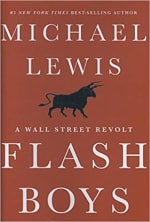

By: Michael Lewis, 2014
As a follow-up to The Big Short, his 2010 bestseller on the 2008 economic crisis, the author turns his attention once again to Wall Street. Constructing an absorbing narrative of the efforts of a colorful group of traders to nudge the US stock market toward reform, in this book Lewis casts a cold eye on some of the worst excesses of this important financial institution.
22. Money and Power: How Goldman Sachs Came to Rule the World
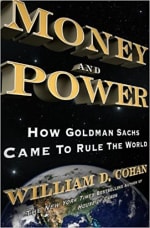

By: William D. Cohan, 2011
In this book, bestselling author Cohan focuses on the role that the mammoth investment and financial services firm, Goldman Sachs (GS), played in the run-up to the 2008 economic crisis. Unlike other similar institutions which operated on the assumption they were “too big to fail,” GS placed its bets against the housing market, thus preserving itself, but at the cost—the author argues—of making the crisis worse.
23. No Logo: Taking Aim at Brand Bullies


By: Naomi Klein, 1999
This book is considered a classic text of the alt-globalist, international social justice movement. The author approaches her topic from a number of different perspectives—historical, geographical, and personal—highlighting many of the deleterious effects of the aggressive branding tactics practiced by major international corporations. A Tenth Anniversary Edition was published in 2009.
24. The End of Poverty: Economic Possibilities for Our Time
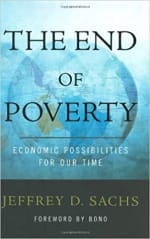

By: Jeffrey D. Sachs, 2005
An architect of the “shock therapy” approach to the privatization of Russian industry after the disintegration of the Soviet Union in 1991, the author turns his attention in this book to the problem of the “extreme poverty” in which approximately one billion people live in the world’s poorest countries. He argues that international aid is essential to help raise these countries to the “bottom rung” of the international economic ladder. From there, they can enter the highly interconnected global marketplace and begin to ascend the ladder on their own. To achieve this, the author recommends full implementation of the UN’s “Millennium Development Goals.”
25. Naked Economics: Undressing the Dismal Science
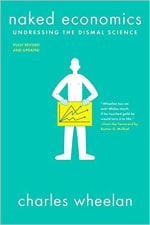

By: Charles Wheelan, 2002
This work is an economics textbook for the general reader. Written in an accessible style, it explains the basic concepts of micro- and macroeconomics in a pleasant and often amusing fashion. The book was released in a third, fully revised and updated edition in 2019. The new edition introduces several topics of recent interest, such as income inequality, the impact of automation on unemployment, the causes of the 2008 economic crisis, and America’s rapidly ballooning national debt.
If you’re interested in dedicating your college education to economics, check out The Best Colleges & Universities for a Bachelor’s in Economics.
For additional study tips and tools, check out our full library of study guides for students.
Or find study tips, learning tools, tips for campus life and much more with a look at our Student Resources Headquarters.